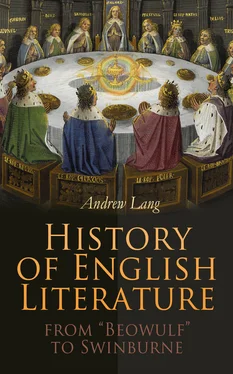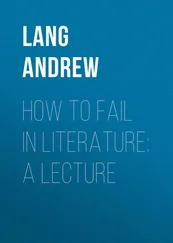Curious and very ancient traits of popular usages may be gathered from the songs of merrymaking, for example in the songs of Ivy, the badge of the women, and of Holly, the badge of the men. Girls and lads bring ivy and holly into halls and a fight ensues, the girls are thrust out into the cold.
"Nay, nay Ivy it may not be, I wis,
For Holly must have mastery, as the manner is."
The girls burned the "Holly boy" of the men, the men burned the "Ivy maid" of the girls. This ancient feud of the sexes, and of their patron birds, exists among the tribes of South-Eastern Australia, the men killing the bird of the women, the women the bird of the men, and an amorous kind of combat follows.
The old ballad of "Chevy Chace," a form of the older ballad on the battle of Otterburn (1388) was warmly praised by Sir Philip Sidney. Later Addison took delight in ballads: they began to be collected and printed in volumes towards the end of the seventeenth and early in the eighteenth century. In 1765 Bishop Percy printed many ballads and other early poems from a manuscript, the "Folio" which he found, tattered and mutilated, in the house of a friend. Percy, in his "Reliques," omitted, altered and modernized the contents of the Folio, but it was very popular. In 1803 and later Sir Walter Scott published "The Border Minstrelsy," containing many excellent old ballads, in places modified by himself, from manuscripts, recitations, and printed copies. It is in "The Minstrelsy" that we find the "classical" versions of the ballads; there are many other collections.
We have put into smaller type a short account of the probable origins and development of the ballad, because a study of these subjects is mainly based on folk-lore and on research into the unwritten poetry of backward races. The reader of poetry who is not concerned about an obscure and difficult subject, is best advised if he takes up Scott's "Border Minstrelsy" and reads it "for human pleasure". He will find endless variety of strong, simple, passionate poetry, seldom made difficult by obsolete words, for the ballads are, however old, far less Scots in language than the poems of Burns. Another good collection is the abridgement by Professor Kittredge, of the late Professor Child's vast collection of ballads in five volumes, a work indispensable to the special student.
Though it is not a ballad, the most beautiful and loyal piece of masterless poetry of this age is "The Nut Brown Maid," already old when it was published in 1502. This is a defence of woman's faithfulness in love, the maid will follow her outlawed lover to the greenwood, ay, even if he have another lady there. Her lover replies:—
Lo yet, before, ye must do more,
Yf ye wyll go with me:
As cut your here up by your ere,
Your kyrtel by the kne;
With bowe in hande, for to withstande
Your enemyes, yf nede be.
Scott's song, "Greta Banks," in "Rokeby," repeats the sentiment and metre of this beautiful poem, with its music and mastery of changing refrains and various measures. Some of the carols too, such as "I sing of a Maid," are the earliest notes in the bird-like music of the lyrists under Elizabeth and Charles I.
PROFESSIONAL POETRY.
Skelton. Barclay.
Meanwhile professional poetry of society and the Court was sinking to the lowest depth. The verse of the prolific priest and scholar, John Skelton (born 1460? died 1529?), leads nowhere, and though it is full of historical and personal interest, must not detain us. Skelton had honours of a sort, as Laureate, from Oxford, Cambridge, and Louvain. He translated parts of Cicero and other classics, and, in 1500, was highly praised by the famous Erasmus, who later brought the study of the New Testament in Greek to England, and was the wittiest of scholars in the Revival of Learning and of Greek literature. Skelton had Latin enough, of Greek not much, and about 1500 was tutor of the future Henry VIII. His profuse poetry is mainly in long but lively stretches of doggerel; very short rhyming verses, generally satirical, poured from him ceaselessly. He had a "flyting" or scolding match like that of Dunbar and Kennedy, with Sir Christopher Garnesche; he lamented at terrible length the death of "Philip Sparrow," slain by "our Cat Gib"—nothing can be less like Catullus's dirge for Lesbia's sparrow, but some graceful compliments to young ladies are intermixed with the doggerel. He owed the Rectory of Diss, Norfolk, probably to his patron, Wolsey, but for some unknown reason he later pursued Wolsey with libellous satires.
In "The Bowge of Court," when he relapses into stanzas and the outworn allegorical verbiage, he satirizes Court life. In "Colyn Clout," his hero is a tramp, as vehement in attack on all sorts and conditions of men as Piers Plowman. Wolsey was attacked as a despot in "Colyn Clout," and much more bitterly assailed in "Why come ye not to Court": after writing this piece Skelton fled from his foes and creditors to sanctuary in Westminster. He wrote a long "Morality," "Magnificence," with the usual personified vices and virtues. In very bad taste he hurled doggerel at "King Jimmy," James IV, after his glorious death at Flodden, and, more deservedly, attacked the Scots who deserted the Duke of Albany and the French when the Duke wished to lead them across the Tweed.
A brief sample of Skelton when most Skeltonical is his reply to the alleged boast of the Scots that they won the battle of Flodden.
That is as true
As black is blue
And green is grey
Whatever they say
Jemmy is dead
And closed in lead,
That was their own king:
Fie on that winning!
Even in his own country, as he admits, the execrable taste of Skelton was reproved. He had a rude kind of vigour, but his verses make it manifest that a new strain of blood, as it were, was needed in English poetry: old forms, such as the allegorical form, were outworn quite, and verse resembling the poem of Aramis, in lines of one syllable, could not endure, while Skelton's "Crown of Laurel" mixes his own blusterous humour with the stale learning, and pompous allegory of the fifteenth century; and "The Tunning of Eleanor Rummyng" (an ale-wife), in doggerel, is as offensive as the Scottish song, "There was a haggis in Dunbar," and extends to 620 lines. Very truly quoth Skelton:—
I have written too mytche
Of this mad mummynge
Of Elynour Rummynge.
Alexander Barclay (died 1552) was probably not a Scot, though his name is spelt in the Scots not the English way (Berkeley). His high praises of James IV of Scotland, however, scarcely indicate an English author, and he was very early regarded as a Scot. He was a priest, a monk of Ely; he dwelt long at St. Mary Ottery in Devon, and was a copious translator. His "Ship of Fools" (1508-1509) is from the German "Narrenschiff" of Sebastian Brandt: his "Castle of Labour," from the French of Gringore was an earlier work. His "Eclogues," in part translated, are very unlike those of Virgil, and their contents are growls in the style of "Colyn Clout".
Barclay used French and Latin versions of the "Narrenschiff," as well as the original "Dutch". He altered and added to his original as he pleased, and he prolongs the cry against abuses raised by Piers Plowman. A writer who takes all follies and vices for his theme, from the frauds of friars, the wickedness of heretics, the oppressions of knights, to the peevishness of the patient who kicks over the table on which the physic bottles stand, can never want matter, and Barclay's matter is exceeding abundant.
But the clever contemporary woodcuts that illustrate his satire are better than his two thousand irregular stanzas in rhyme royal, and if Barclay quarrelled with Skelton the affair is like a feud between Bavius and Maevius. The two writers are characteristic of their rude and chaotic age, which, as regards all but popular poetry, was the dark hour before the dawn.
Читать дальше












